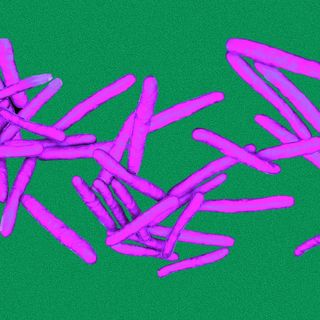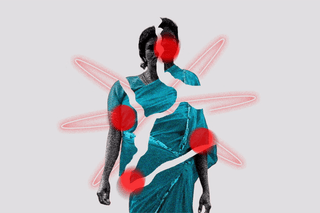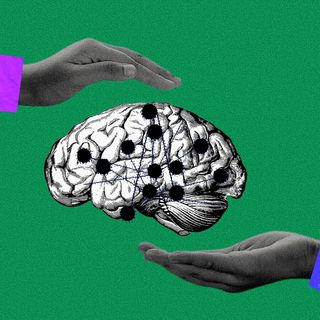
Are Differences in Sex Hormones Behind the High Prevalence of Autoimmune Disorders Among Women?
Autoimmune conditions disproportionately affect women, yet they remain underdiagnosed and undertreated.

In 2016, Arushi Tandon began falling repeatedly ill. It started with bouts of viral fever, soon progressing to immense fatigue, anxiety, skin problems, and loss of appetite. When she visited a doctor to get the lymph node swellings in her neck and underarms checked, the doctor seemed convinced she had cancer.
After eight months of shuttling from one doctor to another, Tandon was finally diagnosed with systemic lupus erythematosus (SLE). Lupus is one of over 80 known autoimmune disorders – conditions where the body’s immune system mistakenly begins attacking its own cells. It is widely accepted in research that autoimmune disorders disproportionately affect women. One study from 1997 noted that around 78% of autoimmune patients in the United States were female. With no known cure, and symptoms that often overlap with common conditions, these disorders remain underdiagnosed and undertreated in women.
Despite the high prevalence of autoimmune conditions among women, Maya Dusenbery, a journalist living with rheumatoid arthritis, told NPR that women’s symptoms are often misdiagnosed or dismissed due to the the long-prevailing gender bias in medicine – the “systemic and unconscious bias” that is rooted in medical curriculum. “The medical knowledge that we have is just skewed towards knowing more about men’s bodies and the conditions that disproportionately affect them,” she said.
For Fiza Jha, 28, it took 5 years to receive a diagnosis of psoriasis – a skin condition characterized by red, scaly patches. Between the ages of 15 and 21, she visited a number of doctors who all said she had Atopic dermatitis or eczema. However, the creams and medicines they prescribed did not work. Meanwhile, the red, itchy rash spread from her legs to her elbows and behind her ears. “I just gave up on it. It was horrible, I was very conscious when wearing skirts and shorts,” she says. Finally, a doctor confirmed she had developed an autoimmune condition.
According to research, a range of contributing factors can trigger autoimmune conditions, including hormonal changes during reproductive cycles.
Although hormonal changes are not the only possible cause for autoimmune disorders, awareness of how these hormones interact with the immune system can help explain the sex bias with which they present. Understanding them can also expand the conversation on women’s health issues that have historically been relegated to the background.
Related on The Swaddle:
All You Need To Know About Psoriasis
“There is a hormone called estrogen in our body which predisposes females to these autoimmune conditions,” explains Dr. Aarti Sharma, rheumatologist and ex-professor in the department of Rheumatology at the All India Institute of Medical Sciences (AIIMS). Many autoimmune disorders thus present themselves in women in the fertile age group. During this period, fluctuating estrogen levels create hormonal imbalances, especially during pregnancy, menopause, and the monthly menstrual cycle.
Further, polycystic ovarian syndrome (PCOS), which is a common condition among women, also causes reproductive hormonal imbalances. Before Tandon was diagnosed with lupus, she did not get her period for around six months. She was subsequently diagnosed with PCOS and hypothyroidism. Some studies have associated PCOS with autoimmune conditions, such as autoimmune thyroid disorder.
Another factor responsible for the sex difference in autoimmune diseases is genetic. Genes linked with the X chromosome – of which women have two – and a process known as X chromosome inactivation predispose them to these conditions.
Previous research, too, suggests a strong link between hormonal changes during reproductive cycles and the development of certain autoimmune conditions in women. According to a report in Scientific American, sex hormones affect the expression of a number of genes involved in immunity. Testosterone, for example, decreases the response of immune cells – a possible reason why men are less prone to developing most autoimmune conditions.
Specifically in the case of pregnancy, estrogen levels rise in the body. “[In] early pregnancy, there are more chances of developing autoimmune conditions and again, once they deliver, the chances of developing autoimmune conditions increases, because of the hormonal changes,” explains Dr. Shallu Verma, a rheumatologist at Metro Heart Institute with Multispeciality, Faridabad.
Pregnancy is considered a “unique immune condition,” where women’s immunity undergoes rapid changes. “Early in pregnancy, certain healthy immune responses increase, which helps the placenta grow new blood vessels; in the middle of pregnancy, immunity decreases. Then immune responses and inflammation increase again in anticipation of labor,” stated the Scientific American report. Dr. Sharma adds that during pregnancy, the underlying immune system gets activated due to the implantation of a “foreign body” in the uterus, potentially acting as a trigger for autoimmune conditions.
However, in the case of people with pre-existing autoimmune conditions, several patterns emerge during pregnancy that make disease activity much more complex. “There are few diseases that go into [an] inactive phase, which we call as remission. Like rheumatoid arthritis, which is the commonest of all, and this disease goes into remission during pregnancy. But there is another set of diseases like lupus. This is one disease which increases its activity during pregnancy which might trigger in repeated abortions and other things as well,” she says.
These observed links between hormonal activity and autoimmune disorders raise several questions about women’s reproductive health as well, including the use of oral contraceptives. Oral contraceptives – which usually contain a combination of two hormones, estrogen and progestin – may disrupt the hormonal balance of the body. One report suggests that the use of oral contraceptives and hormone-replacement therapy has been linked to an increased risk for lupus. Dr. Sharma explains that while oral contraceptives are important and patients are not stopped from taking contraceptive pills, these could slightly increase the risk of disease activity – albeit this has been noticed in a very small percentage of people.
Related on The Swaddle:
Mice Study Suggests Previously Unknown Trigger of Autoimmune Disorders
However, changes in hormonal activity are not the only factor in the high prevalence of autoimmune conditions among women. Among other causes, environmental factors and the disparity in stress burden play a role too. Studies have shown women experience more stress than men. Exhaustion from unpaid domestic work and emotional labor, which have long been responsibilities shouldered primarily by women, increase their stress levels. Added to this is women’s general neglect of their health, as they are often more focused on caring for others than themselves, says Dr. Verma.
“Women are brought by their family for regular check-ups only when they are really ill. They are the ones who are making food at home, doing household activities. So when men in the family or other family members think that they are not able to manage because she’s unwell… That’s the reason they are getting them to the doctor for regular checkups. Once she gets [a] little better, then again they fail to follow up,” Dr. Verma says. This is the reason diseases do not go into remission for many patients, she adds.
These societal pressures, along with a general lack of awareness, also contribute to late diagnosis of autoimmune conditions in women as compared to men, Dr. Verma explains. “In all rheumatological illnesses, the first three weeks are a magic rainbow period,” she says. If the disease gets diagnosed early on and treatment begins, there is a chance that “women can get rid of all the medicines and live a healthy life in two years of treatment.” Instead, “They are reaching us maybe after three to four years of their disease,” Dr. Sharma adds.
Anshul Srivastava, 34, has been living with Ankylosing Spondylitis, a rare form of arthritis that causes pain and stiffness in the spine. Her diagnosis took over 5 years, during which time the condition got worse. From fever, back pain and dizziness, her symptoms progressed to a point where she could not rise from bed due to the swelling in her knees.
These conditions exact a heavy toll on individuals’ minds and bodies, requiring lifelong treatment, medication and lifestyle changes to manage disease activity. “There’s this one particular immunosuppressant that I have to take on a daily basis and if I miss it one day, the next day will be hell for me,” Srivastava says. Tandon’s treatment for lupus, meanwhile, has involved steroids, immunosuppressants, dietary conditions, and even avoiding the sun due to her photosensitive skin. Some of the medication, she adds, has also caused side-effects.
Countless women’s experiences reveal how living with an autoimmune condition is a daily challenge that also deeply affects their mental health. When a flare-up occurs, Srivastava states, “Two weeks of my life are suddenly gone. After those two weeks for me to get back up, go back to work and pick up from the day I left… takes a lot of effort.” Many symptoms of autoimmune conditions, such as chronic pain or fatigue, are not immediately apparent to others. Patients, then, silently suffer the effects of these invisible illnesses.
“What we need to have is more awareness of autoimmune disorders [in women],” says Dr. Rekha Khandelwal, an obstetrician-gynecologist based in Delhi. As a review paper noted, sex-specific differences in autoimmune conditions do not solely relate to the higher number of cases among females but may also affect the severity of symptoms, treatment options, disease course and overall survival of the patient. Understanding this sex bias is critical as it can inform how to improve the quality of life of patients living with autoimmune conditions.
These disorders have a tendency to “stay with you,” Srivastava says, adding that there is a need for community and support groups for those with autoimmune conditions. “It would be nice to know what other people are doing, maybe somebody has figured out how to live with it in a better way. I’m just living in partial denial. Community would really help,” she says.
Ananya Singh is a Senior Staff Writer at TheSwaddle. She has previously worked as a journalist, researcher and copy editor. Her work explores the intersection of environment, gender and health, with a focus on social and climate justice.
Related


A Study Claimed AirPods Can Work as Inexpensive Hearing Aids
